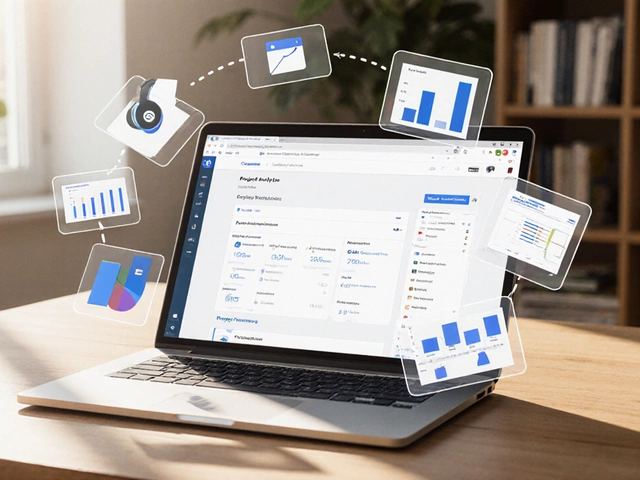
Picture this: your friends are cramming for engineering or medical exams, hunched over dense textbooks. Meanwhile, you’re watching viral TikToks, poking around brand accounts, and researching SEO hacks “for homework.” Sounds like digital marketing must be a cakewalk, right? Actually, a digital marketing degree packs plenty of surprises (and challenges), especially if you think it’s all about scrolling social media. By the time you’re done reading, you’ll know which skills matter, the real demands behind the Instagram filters, and whether this path is as breezy—or as tricky—as people say. Let’s cut through the noise and get real about whether digital marketing is a hard degree.
What a Digital Marketing Degree Actually Involves
At first glance, digital marketing sounds smooth—run some ads, post engaging content, watch results roll in. But when you get into the coursework, things ramp up quickly. You won’t just learn how to post memes or schedule tweets. Instead, the syllabus usually swings across analytics, psychology, copywriting, coding basics, branding, and campaign planning. Some universities focus heavily on data, teaching you to understand Google Analytics reports or optimize conversion funnels, while others turn up the volume on creative work like video editing, design, or persuasive writing.
Here's the thing: digital marketing is always evolving. So, courses update their material constantly, sometimes between semesters. You might learn last year’s Instagram algorithm in freshman year, only to find it flipped on its head by your final exam. This need for constant adaptation takes out the autopilot; students have to chase trends, test ideas, and keep tabs on updates just to keep up. For those who love variety, that’s a perk. If you prefer strict rules and no surprises, you’ll hit roadblocks fast.
The assignments? They go way beyond essays. One week, you may be expected to create a content calendar for a mock startup. The next, you're deep-diving into SEO, hunting down which keywords could rocket a website up Google’s front page. There’s usually a hefty group work element—simulating agency life—where you’ll argue over creative campaigns, present mock pitches, or manage digital ad budgets. This blend of solo deep-dives and teamwork mimics what real agencies do every day. It’s less about breezy lectures, more about deadlines, competing ideas, and making sure your data matches your creative hunches.
Assessments pull from real-world systems. You’ll run Google Ads experiments (sometimes with actual money), crack social insights using Facebook’s ad manager, or build basic websites to test landing pages. These hands-on projects mean you’re not just memorizing facts for tests; you’re always pitching, optimizing, and tracking results. Professors expect you to treat your projects with the same seriousness an agency would—meaning late nights, tweaks, and sometimes seeing your boldest idea fall flat. Resilience is a must.
To give a taste of the diversity in digital marketing studies, here’s a table showing common core modules:
| Module | Skills Focused | Real-World Use |
|---|---|---|
| SEO & SEM | Analytics, keyword research | Improving site visibility, Google Ads |
| Content Marketing | Writing, storytelling | Blogging, video scripts, social posts |
| Social Media Strategy | Platform management, engagement | Brand account growth |
| Data Analytics | Interpreting reports, testing | Measuring campaign ROI |
| Email Marketing | Copywriting, automation | Email newsletter design |
| Branding & Creative | Graphic/video editing, design thinking | Campaign launches |
| Web Basics | HTML/CSS, user experience | Building/testing sites & ads |
If you thrive on hands-on learning, it’s golden. But if you just want to memorize and forget, you’ll struggle. You need flexibility, curiosity, and grit—those matter way more than memorizing definitions.
How Hard Is Digital Marketing Compared to Other Degrees?
Let’s say it straight: digital marketing is hard, but it’s a different flavor of hard. Compare it to accounting or chemistry, with their mile-long formulas and right-or-wrong test answers. In digital marketing, rarely does “one right answer” exist. Expect your ideas to get questioned, your creative angles to get picked apart, and your reports to be challenged for better evidence. Success rides on interpretation, creativity, and communication as much as technical skills—sometimes more.
The workload can surprise you. According to a 2024 student survey by the UK’s Chartered Institute of Marketing, those majoring in digital marketing clock an average of 36 hours per week on lectures, projects, and extra online courses—about the same as business and engineering students. The twist? A chunk of that time is self-learning. Algorithms and ad formats don’t wait for your class schedule, so students hunt for online certifications, experiment with side projects, and chase industry changes. You may see your friends in other majors putting in similar hours, but their curriculum usually doesn’t demand constant adaptation like digital does.
Think about group work, too. Digital marketing degrees double down on teamwork. You’ll be thrust into mock agencies, given tight deadlines, and asked to defend your campaign strategies to professors or even real business partners. That forces you to negotiate, compromise, and sometimes lead a team that’s barely on the same page. Social skills and emotional intelligence make a noticeable difference here.
Where some degrees reward clear answers and isolated study, digital marketing pushes you to combine dozens of moving pieces and prove your thinking to classmates, clients, and teachers. It’s a skill set closer to entrepreneurship than bookkeeping. If you like structured routines and predictable exams, you might find this chaos tough. But for anyone energized by change, collaboration, and a seat at the creative table, it’s hard work with a payoff.
Here are some key ways digital marketing is challenging, side by side with other degrees:
| Degree | Main Challenges | Type of Hard Work |
|---|---|---|
| Digital Marketing | Adapting to trends, group projects, self-learning, creative pitching | Creative, analytical, collaborative |
| Engineering | Technical complexity, heavy math, intensive labs | Logical, technical, strict testing |
| Psychology | Case study analysis, theory-heavy exams | Reading, essay-based, abstract reasoning |
| Accounting | Complex rules, formulaic tests | Formula-driven, precise accuracy |
| Computer Science | Programming, heavy logic, debugging | Coding, analytical problem-solving |
No degree is “easy” in a meaningful sense, but digital marketing throws curveballs that trip up those expecting an easy ride. Where it’s forgiving on math, it’s brutal on deadlines and collaboration. Where there’s little rote memorization, there’s lots of pressure to justify every decision and stay up to date.

The Skills You Really Need (and Tips to Survive)
The fantasy is tempting—imagine becoming a digital guru just by knowing what’s trending on Instagram or by posting funny memes. But survive (and thrive) in a digital marketing degree, and you’ll need a mixed bag of skills way beyond what’s visible online.
Digital marketing degree programs demand students bridge the worlds of creative content and data-driven decisions. Creativity matters, but here’s the catch: you’re expected to back it up with analytics and prove it brings results. It’s easy to come up with wild campaigns, but harder to show how they'd generate leads, hit KPIs, or reach new audiences. Being able to write well, design eye-catching visuals, and edit videos is great—but interpreting data, tweaking strategies, and communicating why your ideas matter is where you truly level up.
Time management becomes your best friend. Projects stack up, deadlines are tight, and clients (sometimes professors) expect quick turnarounds. Procrastinate, and you'll drown. Staying organized isn’t just about color-coded spreadsheets (although, they help a lot)—it’s scheduling, running A/B tests, managing the back-and-forth with teammates, and adjusting quickly when things don’t go as planned.
A big tip: certifications outside your degree can make a huge difference. Platforms like Google, HubSpot, Meta, and LinkedIn Learning offer short, industry-respected certifications in ad buying, analytics, and social strategy. Many employers scan for these on resumes. Students who tackle these alongside their degree have a stronger shot at internships (and better real-world skills during job interviews). Easy? Not really—juggling schoolwork and extra certs adds to your calendar, but the payoff is huge.
Building a personal brand helps, too. Potential employers love seeing students with real online portfolios—blogs, YouTube channels, or even smart LinkedIn profiles—where you can showcase your projects. Even running a small Instagram business or managing a non-profit campaign gives you concrete talking points by graduation that someone who only did assignments won't have.
Here are some street-smart tips to make it through digital marketing school with less stress:
- Don’t treat your coursework as ‘just tasks’—tie projects to real brands where possible. Even informal partnerships can become resume gold.
- Master feedback. Your professors and classmates will critique your campaigns, sometimes harshly. The earlier you view feedback as a tool, not a personal attack, the faster you’ll improve.
- Join extracurriculars—clubs, competitions, or national student contests like Google Online Marketing Challenge. They’re networking goldmines and look incredible on CVs.
- Mess around with your own side project: blog, podcast, TikTok page, whatever excites you. It’s hands-on, with zero grade pressure, and teaches you quicker than some classes.
- Keep tabs on digital news—sites like Search Engine Journal, AdWeek, and social updates are daily musts. Algorithms can flip overnight, and knowing these shifts early keeps you ahead in both class and future jobs.
Digital marketing needs sharp writing, comfort with numbers, bold ideas, and no fear of reinterpretation. It’s hard, but if you love change, chatting with people, and solving creative puzzles, you’ll thrive. The work’s not about flashy job titles—it’s learning how to listen, adapt, and experiment with what actually moves audiences right now.
What Can You Actually Do With the Degree?
Here’s where digital marketing really flexes: its career options are almost endless. The skills baked into the degree—data interpretation, hands-on creative, communication, fast learning—open up opportunities in dozens of directions beyond “social media manager.”
The obvious jobs are there: SEO specialist, PPC campaign manager, content strategist, email marketing expert, digital analyst, brand manager. But more fields add these skills every year—public relations, e-commerce, UX research, influencer management, even politics and healthcare communication. A lot of grads mix digital with offline marketing or use it as a launchpad for entrepreneurship. The biggest companies scan for digital know-how, but so do startups—and even non-profits hungry for attention online.
Digital marketing also carries strong job growth. The US Bureau of Labor Statistics, for instance, predicts jobs in marketing and promotions will grow by up to 10% from 2022 to 2032, faster than most other professions. This is partly because every company, from tiny cafés to tech giants, now relies on digital ads, savvy campaigns, and quick pivots to reach audiences swamped with content. Even as some digital roles shift with AI and automation, skilled marketers are needed to set strategy, interpret data, and connect ideas with audiences.
Salaries flex widely. Entry-level digital marketing assistants in the UK or US usually start around $35,000–$40,000 a year, but digital strategists, managers, and consultants can clear $60,000–$100,000+ with experience and specialization. Freelancers and consultants sometimes make more by carving out a focused niche—copywriting for SaaS, or TikTok campaigns for retail brands, for instance. The best-paid aren’t just technical—they’re creative thinkers who adapt and prove their campaigns work with hard numbers.
But digital marketing isn't for everyone. You’ll face client feedback, fast pivots, evolving tools, and high expectations. Careers reward adaptability, resilience, open communication, and willingness to learn. The degree arms you with practical skills, but what matters most is whether you’re hungry to use them in new ways, with new tech, and changing needs. For students who want to “set and forget”—do the same thing every year—it’s not the right fit. For the experimenters, collaborators, and fast learners, there’s almost no better ticket.
Students often say afterwards that digital marketing degrees made them better at reading people, working in teams, and explaining their ideas clearly—skills valuable everywhere, even if you pivot to a totally new field later. Sure, it can be stressful, and there’s never a straight path from school to corner office. But if you’re curious, sociable, a bit analytical, and love shaking things up, the ride (and the degree) are worth it—challenges included.




